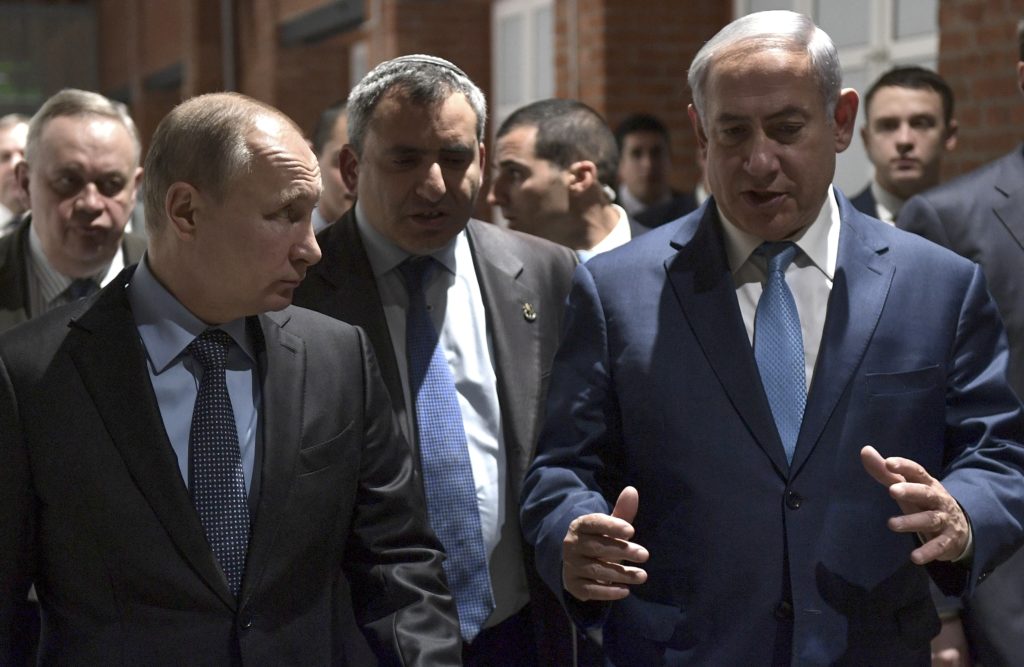Israeli analysts explain the government’s reasons for not joining Western countries in expelling Russian diplomats in the aftermath of recent poisoning of a former Russian spy in Britain.
Steve Leibowitz, World Israel News
Many Western countries ordered the expulsion of Russian diplomats as punishment for its alleged poison gas assassination attempt on a former Russian spy last month in Britain. Israel did not follow the lead from London and Washington, even declining to name “Russia” while issuing a general condemnation of the alleged Russian action. The targets, Sergei Skripal and his daughter, remain in critical condition.
Cabinet Minister Yoav Gallant explained the Israeli position, saying, “While Israel should behave as part of the Western world, we also negotiate with, and live side-by-side with, the Russians,” he said. “With Russia in Israel’s backyard, Jerusalem must do what is in its interests and not what is in the interests of others. Israel has maneuvered carefully in a very complicated situation.”
Gallant told The Jerusalem Post that Israel’s relationship with the Russians is not at all what it was before the collapse of the Soviet Union. “We talk to them, they talk to us. There is a mechanism on the military side [in Syria] that everyone can see. We respect the Russians. The Russians are not our enemies, and we should use the upside of their presence [in Syria] and try to avoid the downside of their presence.”
Gallant cited the potential of a war between Israel and the Iranian-backed Hezbollah. “When a superpower is here, it gives a dimension of stabilization to the situation. A war between Israel and Hezbollah is not a Russian interest, it doesn’t serve them in any way – and they know how to deter these guys,” Gallant said.
A ‘hysterical anti-Russian campaign’
Britain let Israel know that it was not pleased. The British Embassy in Tel Aviv released a statement saying that it expects “strong statements of support from all our close partners, Israel included.” Moscow praised Israel for not being drawn into what it said was a “hysterical anti-Russian campaign” following the poisoning.
Dan Diker of the Jerusalem Center for Public Affairs told World Israel News (WIN) that “Israel faces an existential threat just over the border in Syria, where Russia has a military presence and where Iran has established bases. Russia is playing a very important role, including turning a blind eye when Israel takes military action in Syria. Keeping good relations with Russia is a priority. Israel is among the smallest sovereign states in the world. We face threats on all sides. Our defense and foreign policy doctrine is to defend ourselves by ourselves, and that comes before all else.”
An Israeli analyst who declined to be identified told WIN, “We have assassinated enemies when necessary. That’s apparently what Russia did in this case. Of course it’s wrong, but we have a priority of survival, and that includes maintaining a delicate balance with Russia. Putin is a mobster and a killer. What are we going to do? We have to protect ourselves. As strong as we are, we cannot get involved in something like this. As the former President of France Charles De Gaulle said, countries have no sympathies or friends, only interests.”
Veteran Middle East analyst Amotz Asa-el told WIN, “Basically Israel is trying to be neutral in this unfolding of ‘Cold War 2.’ We saw this Israeli inclination in the Russian annexation of Crimea and the clashes in Ukraine. Israel broke rank and did not condemn Russia or order sanctions. The rational is that we have a lot of Jews in Russia and a lot of Russian speakers here in Israel. Add to that the fact that Putin has fighter jets in Syria and we don’t want to mess around. Putin has been OK with Israel, and we have had good relations for the past 25 years with the breakup of Communism and the Soviet Union. Israel has to pay a price for the rapprochement.”
Government, opposition agree on approach to Russia
Asa-el notes that Israel’s coalition and opposition are united in the policy toward Russia. “Clearly, there is across-the-board support for avoiding tension with Russia. It’s not pleasant for us, but by now the US does not expect us to act differently. They know that we have the Russian air force on our border… We are neutral like Finland during the cold war. They knew that Russia can be a nasty neighbor and chose to stay out of line of fire,” he explained.
“Britain is our friend but we are not bound by Nato or European Union membership,” veteran Israeli Ambassador Avi Pazner told WIN. “We have good ties with Russia, but we also have to be careful with them. Their military presence in Syria cannot be ignored. They close an eye and do not object when we find a need to strike in Syria. We face the danger of Iran, and down the road, we will need Russian help to keep the Iranians in check.”


